The
Case of the Velvet Claws
Perry Mason
The beautiful
construction is a trapdoor that supports the accused when she is finally placed
there, and then opens to hang the culprit. A congressional candidate visits a
roadhouse with his married mistress, illegal gambling is carried on there,
gangsters fire shots, she leads him out through the ladies’ room, a
photographer snaps his picture blurrily and sells it to a scandal sheet that
nets a hefty income for its owner, the lady’s husband, with chantage.
He’s found
dead, she reluctantly admits after much prevarication that she shot him in
self-defense, and misled the police to protect her lover.
But it was the
inheriting nephew who took the gun that had missed and, after laughing with his
uncle about a bullet in the bathwater, killed him with it.
The canny
housekeeper is a witness, the heir is immediately betrothed to her innocent
daughter.
The Case of the
Tsarina’s Tiara
Perry Mason
Jones directs
this with almost brutal honesty and rigor in simple, direct shots, to take the
mickey right out of the thing.
The script by
Ernest Frankel and Orville H. Hampton is frankly surrealistic. Jewels are taken
from a Central American shrine and used to enrich a facsimile of the title
object, which is passed off as the real thing.
In order to
accomplish this, it’s necessary to frame for murder the one man in the
world who can identify the original stones. On top of that, it’s placed
to avoid scrutiny in an art museum (the writers’ crowning touch).
“I was
victimized,” complains Leonid Kinskey on the witness stand,
“vic-ti-mized!” The theme also figures in “The Case of
the Twice Told Twist” (dir. Arthur Marks). The
opening scene of a cat burglar switching the stones for paste with an elaborate
apparatus anticipates I Spy’s
“To Florence with Love” (dir. Robert Butler) by a little
more than half a year.
The Case of the Unwelcome
Well
Perry Mason
Ernest Frankel
& Orville H. Hampton describe in no uncertain terms a deliberate cessation
of oil production in the U.S. (new oil production, that is), and the importing
of Arab oil. The purpose is to conserve oil and prices.
There is a
construction here out of Oglethorpe’s diaries that leads to
Richardson’s The Border. The oil company head is a man of
unlimited greed “and let the other fellow be hanged.” He changes
mistresses with the same cold aplomb.
Jones has an
especial feeling for night exteriors (nuit américaine) in the desert oil fields, to the sound of
crickets and a passing car or pumps amid the resonant storage tanks.
The
murderer’s counteroffer is a restoration of equity.
Don’t Worry
We’ll Think of a Title
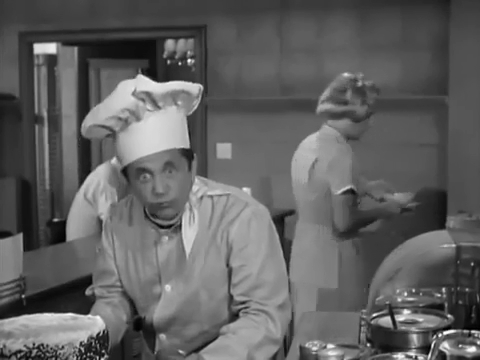
“Boy,
I’m not gonna eat in a joint like this.” Short
order cook who addresses his boss as “Your Majesty” mistaken for Jascha “whose space capsule came down without
him” Nudnik, absconded cosmonaut (“Good Yontiff”
he says in a farewell note announcing his defection, the enbassy
says “we didn’t know he was Jewish”). “Good
thinking!” A sort of Catskills James Bond (who also figures). Homage to Tashlin (Who’s
Minding the Store?), “noon hour rush”. Homage
to Capra (It Happened One Night) in
bloomers, “lemme
show ya how to stop a car.”
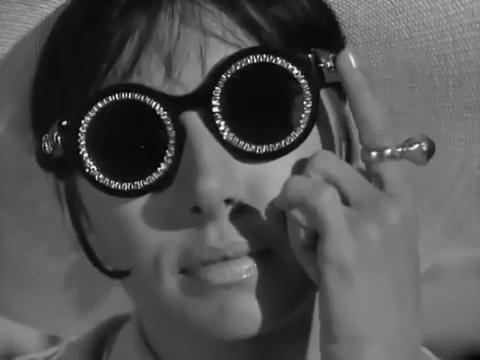
“Do you
have any soup on the menu?” The heiress of
Updike, a college town, Ye Old Booke Shoppe there. “Yeah,
we did have, but we wiped it off, ha ha ha—” Homage to Brooks & Henry (Get Smart), “Comrade Seed, where
are you?”
“Back up
your car two feet and you’ll find out.” Moe
Howard’s impression of E.G. Marshall, one of many guest appearances. Morey Amsterdam’s impression of Tom Wesselmann
painting a girl and an orange for the beatnik set, following the first sight of
a modern daub with flute flourish to match, “oh, any idiot would know what that
is.”
“All right,
idiot, what is it?”
“Sunset at the City Dump.” Homage
to Hitchcock (Psycho), a stuffed
raven, “it’s a canary that used to work in a coal mine” (and
Amsterdam’s immortal riposte, “what are you lookin’
at?”). The Sphinx, no less (Blackmail). “Sure, whaddya expect
with McKinley president?” Burns & Allen in The Babbling Book (dir. Aubrey Scotto), Robert Benchley on biology, spies and counterspies. “If it’s good enough for my kid, it’s good enough for you.” That old rocking chair...
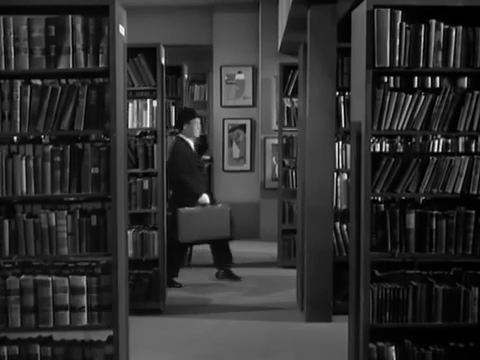
Gargantua et Pantagruel. Homage
to Lubitsch (Ninotchka), an
incapacitating comedy with an astoundingly homely Olga incognito who has a
camera in her flowered hat (contraposed by an
electric carving knife on a “Civil War veteran” in the opening
scene) carrying images back to her boss loomed over by “‘The’
Button”, and a Polaroid for traffic accidents.
The case of the
transistorized turtle. “This could be as
important as the H-bomb.”
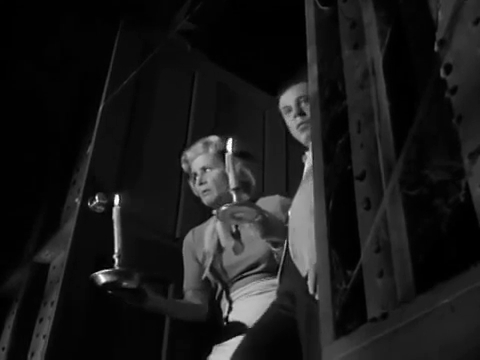
“Charlie, gimme a hand,
will ya?” Cf.
Cassavetes’ A Woman under the
Influence. “Looks like my mother’s
house in Jersey.” Question of tapes and
documentation “of the utmost importance to the space program of our
beloved country, Klabiasha” (the fired cook
turned bookstore clerk, whose name is Yukapuk, says “gee,
what a hokey name for a country”). The Cold War
in a ghostly basement, “gesundheit.”
“Thank you.” An impromptu lecture on Pablo Pizzicato, Paul Gogoon, and “who’s that guy with a name like a
chicken, oh, uh, Pu—uh, Jackson Pullet.” The TV set they pull the plug on and there’s
still shooting. Cowboys
in India, just ahead of Blake Edwards’ The Party (cf. Satyajit
Ray’s Agantuk).
Tashlin again (The Man from the Diners’ Club) at
the beatnik frat party (where Richard Deacon, called “beachhead”
earlier as the man from the Daredevil Diner, now playing the police chief undercover
in a longhair wig but wearing a badge offers to remove his wide checkered hat
and so pass unrecognized), to say nothing of Roger Corman at all... Brooks & Henry again, for Mr. Big.
Homage to Bacon (Larceny, Inc.).
TV Guide,
“abominable”. Sandra Brennan (All Movie Guide), “crummy”. “Only your chicken plucker
knows,” as Rose Marie would say.
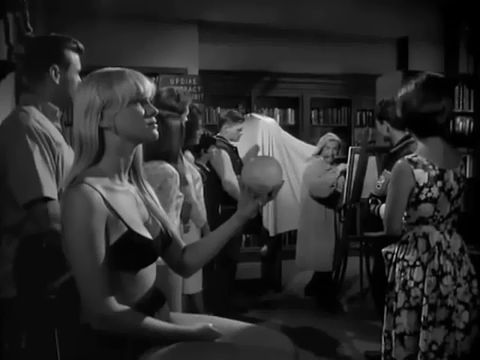
Tiger, Tiger
Tarzan
Fire and tiger
beset the region like two scourges, the one a mask of hypocrisy like the other.
The Borgesian
teleplay by Jackson Gillis pits an irrigation engineer against the stubborn
tribal chiefs who are slowly turning to agriculture, and a proselytizer against
their wisdom, which is very old, old as trees and sun.
A tiger haunts
the place inexplicably, a fire is set to rout it. Each
man confronts his own image, and loses a subordinate to it. The tribesmen have
the last word.